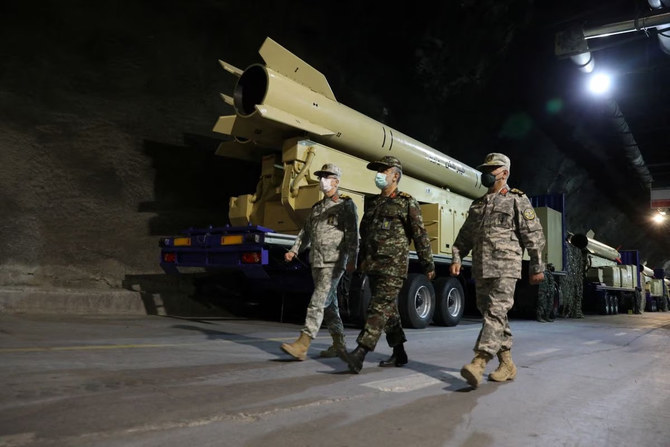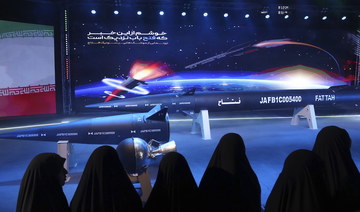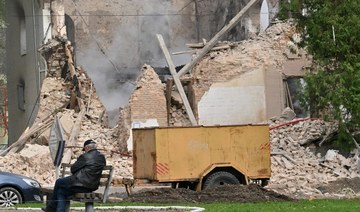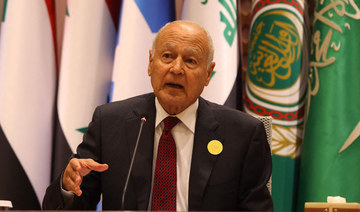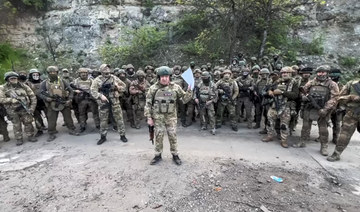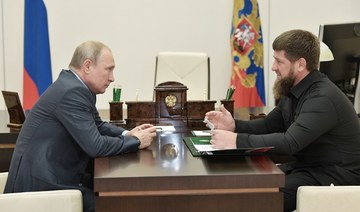DUBAI: Iran has provided Russia with a large number of powerful surface-to-surface ballistic missiles, six sources told Reuters, deepening the military cooperation between the two US-sanctioned countries.
Iran’s provision of around 400 missiles includes many from the Fateh-110 family of short-range ballistic weapons, such as the Zolfaghar, three Iranian sources said. This road-mobile missile is capable of striking targets at a distance of between 300 and 700 km (186 and 435 miles), experts say.
Iran’s defense ministry and the Revolutionary Guards — an elite force that oversees Iran’s ballistic missile program — declined to comment. Russia’s defense ministry did not immediately respond to a request for comment.
The shipments began in early January after a deal was finalized in meetings late last year between Iranian and Russian military and security officials that took place in Tehran and Moscow, one of the Iranian sources said.
An Iranian military official — who, like the other sources, asked not to be identified because of the sensitivity of the information — said there had been at least four shipments of missiles and there would be more in the coming weeks. He declined to provide further details.
Another senior Iranian official said some of the missiles were sent to Russia by ship via the Caspian Sea, while others were transported by plane.
“There will be more shipments,” the second Iranian official said. “There is no reason to hide it. We are allowed to export weapons to any country that we wish to.”
UN Security Council restrictions on Iran’s export of some missiles, drones and other technologies expired in October. However, the United States and European Union retained sanctions on Iran’s ballistic missile program amid concerns over exports of weapons to its proxies in the Middle East and to Russia.
A fourth source, familiar with the matter, confirmed that Russia had received a large number of missiles from Iran recently, without providing further details.
White House national security spokesperson John Kirby said in early January the United States was concerned that Russia was close to acquiring short-range ballistic weapons from Iran, in addition to missiles already sourced from North Korea.
A US official told Reuters that Washington had seen evidence of talks actively advancing but no indication yet of deliveries having taken place.
The Pentagon did not immediately respond to a request for comment on the missile deliveries.
Ukraine’s top prosecutor said on Friday the ballistic missiles supplied by North Korea to Russia had proven unreliable on the battlefield, with only two of 24 hitting their targets. Moscow and Pyongyang have both denied that North Korea has provided Russia with munitions used in Ukraine.
By contrast, Jeffrey Lewis, an expert with the Middlebury Institute of International Studies at Monterey, said the Fateh-110 family of missiles and the Zolfaghar were precision weapons.
“They are used to point at things that are high value and need precise damage,” said Lewis, adding that 400 munitions could inflict considerable harm. He noted, however, that Russian bombardments were already “pretty brutal.”
US AID DELAY WEAKENS UKRAINE’S DEFENCES
A Ukrainian military source told Reuters that Kyiv had not registered any use of Iranian ballistic missiles by Russian forces. The Ukrainian defense ministry did not immediately reply to Reuters’ request for comment.
Former Ukrainian defense minister Andriy Zagorodnyuk said that Russia wanted to supplement its missile arsenal at a time when delays in approving a major package of US military aid in Congress has left Ukraine short of ammunition and other material.
“The lack of US support means shortages of ground-based air defense in Ukraine. So they want to accumulate a mass of rockets and break through Ukrainian air defense,” said Zagorodnyuk, who chairs the Kyiv-based Center for Defense Strategies, a security think tank, and advises the government.
Kyiv has repeatedly asked Tehran to stop supplying Shahed drones to Russia, which have become a staple of Moscow’s long-range assaults on Ukrainian cities and infrastructure, alongside an array of missiles.
Ukraine’s air force said in December that Russia had launched 3,700 Shahed drones during the war, which can fly hundreds of kilometers and explode on impact. Ukrainians call them “mopeds” because of the distinctive sound of their engines; air defenses down dozens of them each week.
Iran initially denied supplying drones to Russia but months later said it had provided a small number before Moscow launched the war on Ukraine in 2022.
“Those who accuse Iran of providing weapons to one of the sides in the Ukraine war are doing so for political purposes,” Iranian Foreign Ministry spokesperson Nasser Kanaani said on Monday, when asked about Tehran’s delivery of drones to Russia. “We have not given any drones to take part in that war.”
Rob Lee, a senior fellow at the Foreign Policy Research Institute, a Philadelphia-based think tank, said a supply of Fateh-100 and Zolfaghar missiles from Iran would hand Russia an even greater advantage on the battlefield.
“They could be used to strike military targets at operational depths, and ballistic missiles are more difficult for Ukrainian air defenses to intercept,” Lee said.
DEEPENING TIES WITH MOSCOW
Iran’s hard-line clerical rulers have steadily sought to deepen ties with Russia and China, betting that would help Tehran to resist US sanctions and to end its political isolation.
Defense cooperation between Iran and Russia has intensified since Moscow sent tens of thousands of troops into Ukraine in February 2022.
Russia’s Defense Minister Sergei Shoigu met the head of Iran’s Revolutionary Guards Aerospace Force, Amirali Hajjizadeh, in Tehran in September, when Iran’s drones, missiles and air defense systems were displayed for him, Iranian state media reported.
And last month, Russia’s foreign ministry said it expected President Vladimir Putin and his Iranian counterpart Ebrahim Raisi to sign a broad new cooperation treaty soon, following talks in Moscow in December.
“This military partnership with Russia has shown the world Iran’s defense capabilities,” said the military official. “It does not mean we are taking sides with Russia in the Ukraine conflict.”
The stakes are high for Iran’s clerical rulers amid the war between Israel and Palestinian Islamist group Hamas that erupted after Oct. 7. They also face growing dissent at home over economic woes and social restrictions.
While Tehran tries to avoid a direct confrontation with Israel that could draw in the United States, its Axis of Resistance allies — including Hezbollah in Lebanon and the Houthis in Yemen — have attacked Israeli and US targets.
A Western diplomat briefed on the matter confirmed the delivery of Iranian ballistic missiles to Russia in the recent weeks, without providing more details.
He said Western nations were concerned that Russia’s reciprocal transfer of weapons to Iran could strengthen its position in any possible conflict with the United States and Israel.
Iran said in November it had finalized arrangements for Russia to provide it with Su-35 fighter jets, Mi-28 attack helicopters and Yak-130 pilot training aircraft.
Analyst Gregory Brew at Eurasia Group, a political risk consultancy, said Russia is an ally of convenience for Iran.
“The relationship is transactional: in exchange for drones, Iran expects more security cooperation and advanced weaponry, particularly modern aircraft,” he said.



